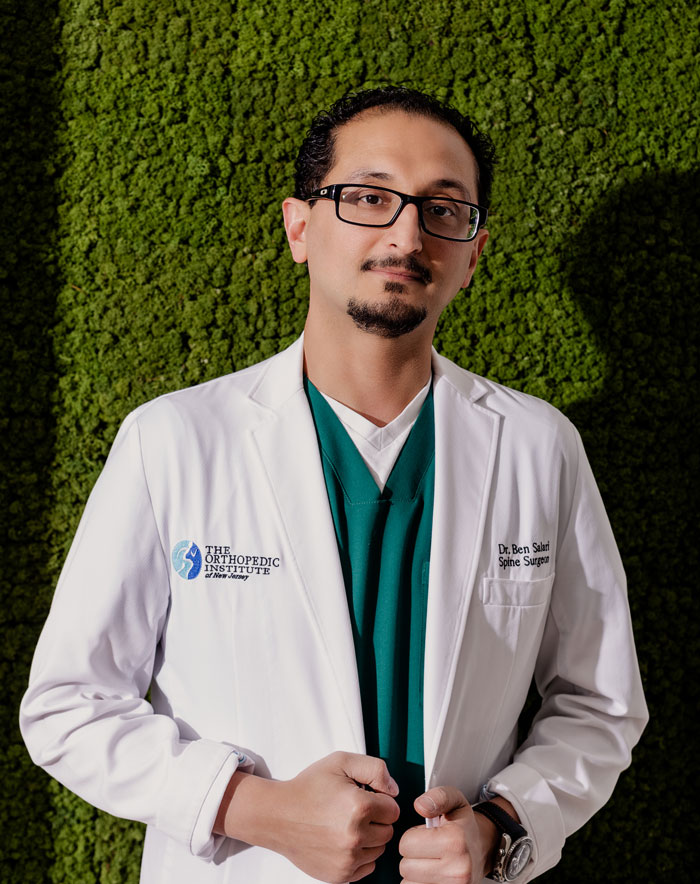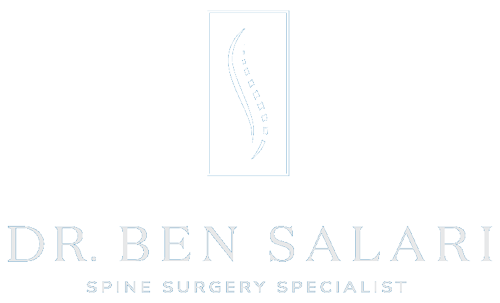Spinal stenosis is a condition characterized by the narrowing of spaces within the spine, which leads to nerve compression and various symptoms. Dr. Salari provides personalized treatment plans for spinal stenosis, ranging from physical therapy and medications to minimally invasive spine surgery, when necessary.
Causes and Treatment
of Spinal Stenosis
Spinal stenosis generally occurs because of the age-related degeneration of the bony structures of the spine, leading to nerve compression. It can also happen because of injuries or severe disc herniation, resulting in weakness, numbness, and pain in different parts of the body. Dr. Behnam Salari, the leading orthopedic surgeon in New Jersey, diagnoses and treats the root cause of spinal stenosis in Morristown using minimally invasive techniques.
What is Spinal Stenosis?
The spinal canal consists of a series of vertebrae (bones) separated by cushion-like intervertebral joints that absorb the shock of movements. There are small gaps between the vertebrae, where the nerve roots can exit and branch outwards from the spine, providing sensation and mobility to different parts of the body. The nerve roots must move in and out of the intervertebral spaces without obstruction.
Spinal stenosis is a condition wherein the intervertebral spaces are narrowed, thereby leading to obstructions for the nerve roots. The narrowing of the intervertebral spaces may occur for numerous reasons, such as the age-related degeneration of the intervertebral discs and joints, excessive disc herniation, spinal trauma, and more. Different components of the spine can pinch or compress the nerve roots, leading to different types of pain and discomfort.

Potential Causes of Stenosis:
- Osteoarthritis
- Spondylolisthesis
- Disc herniation
- Degenerative disc disease
- Tumors
- Spinal trauma and injuries
- Congenital conditions, such as dwarfism
Symptoms of Cervical Stenosis:
- Mild to severe neck pain
- Radiating pain and weakness in the shoulders, arms, and hands
- Numbness in the shoulders and extremities
- Loss of mobility in the arms and hands
- Changes in balance and posture


Symptoms of Lumbar Stenosis:
- Mild to severe lower back pain
- Radiating pain and weakness in the lower back, buttocks, and legs
- Numbness in the buttocks and lower extremities
- Difficulty in walking or standing still for extended periods
- Reduced pain while stooping down or sitting
- Inability to walk for long distances
- Intermittent leg pain (neurogenic claudication)
- Foot pain and problems
Diagnosing Stenosis
Spinal stenosis in Morristown leads to different types of symptoms, depending on the location of the compressed nerves. Dr. Salari will carefully review your symptoms and perform diagnostic tests to visualize the damaged components. He may recommend x-rays, CT scans, and MRI scans to visualize the bone tissues and soft tissues on your spine, thereby revealing the root cause of stenosis, allowing him to curate a personalized treatment plan.


Treatment options for spinal stenosis
After a thorough diagnosis, Dr. Salari develops a comprehensive treatment plan to address your symptoms and improve your quality of life. Dr. Salari always starts with conservative treatments to manage your condition. He only recommends surgery when absolutely necessary, ensuring that all other options have been thoroughly explored. Your treatment may include:
- Rest and recovery to allow your spine to heal
- Medications to reduce inflammation and relieve pain
- Physical therapy to strengthen your muscles and improve flexibility to support your spine
- Steroid injections to alleviate pain and inflammation in the affected areas
- If all else fails, minimally invasive spine surgery to address the root cause
Schedule an appointment with Dr. Ben Salari to receive expert diagnosis and a personalized treatment plan for spinal stenosis in Morristown.
Spinal Stenosis FAQs
What role does genetics play in spinal stenosis?
Genetics can contribute to the risk of developing spinal stenosis. While aging and wear and tear on the spine are primary factors, a family history of the condition might increase susceptibility.
Is spinal stenosis preventable?
While spinal stenosis is often age-related, maintaining good posture, exercising regularly, and avoiding smoking can reduce the risk. However, complete prevention may not be possible.
Can epidural injections provide relief from spinal stenosis symptoms?
Epidural injections may offer temporary relief for a few weeks by reducing inflammation and numbing pain. However, they don’t address the root cause of spinal stenosis, so they are typically part of a comprehensive treatment plan for managing symptoms of spinal stenosis in Morristown.
What lifestyle changes can help manage spinal stenosis?
Staying physically active, maintaining a healthy weight, practicing good posture, and performing exercises that strengthen core muscles can alleviate spinal stenosis symptoms and improve overall spinal health. These are things that should be done in addition to any treatment to more rapidly recover from spinal stenosis.
Can pregnancy worsen spinal stenosis symptoms?
Pregnancy can potentially worsen existing spinal stenosis symptoms. The increased weight and hormonal shifts during pregnancy can strain the spine and intensify discomfort. While not all pregnant individuals with spinal stenosis will experience worsened symptoms, it’s advisable to consult a specialist like Dr. Salari for an evaluation.
Testimonials

Dr. Behnam Salari
Board Certified by the American Osteopathic Board of Orthopedic Surgery
Contact Dr. Salari for Spinal Stenosis Treatment
Dr. Behnam Salari is a board-certified spine surgeon specializing in the latest minimally invasive spine surgery techniques. He discusses your unique goals and symptoms, reviews your medical history, and performs various imaging tests to curate a comprehensive, personalized spinal stenosis treatment plan. If you need lumbar spinal surgery, he specializes in minimally invasive procedures that address the root cause of your problems without considerable downtime.
If you have the signs and symptoms of nerve compression and spinal stenosis in Morristown, please schedule a consultation with Dr. Ben Salari at our state-of-the-art offices in Morristown, Hackettstown, Sparta, or Randolph in New Jersey.

